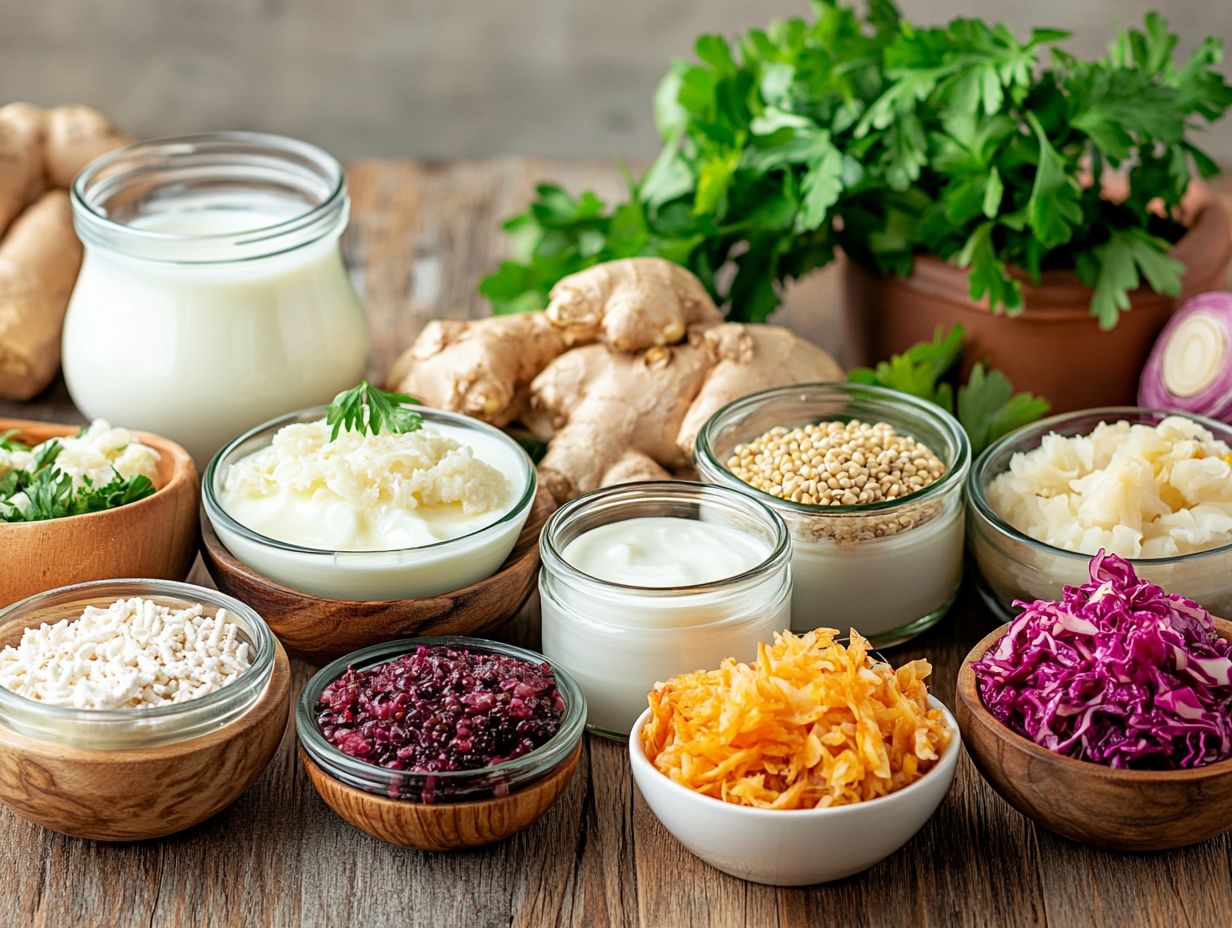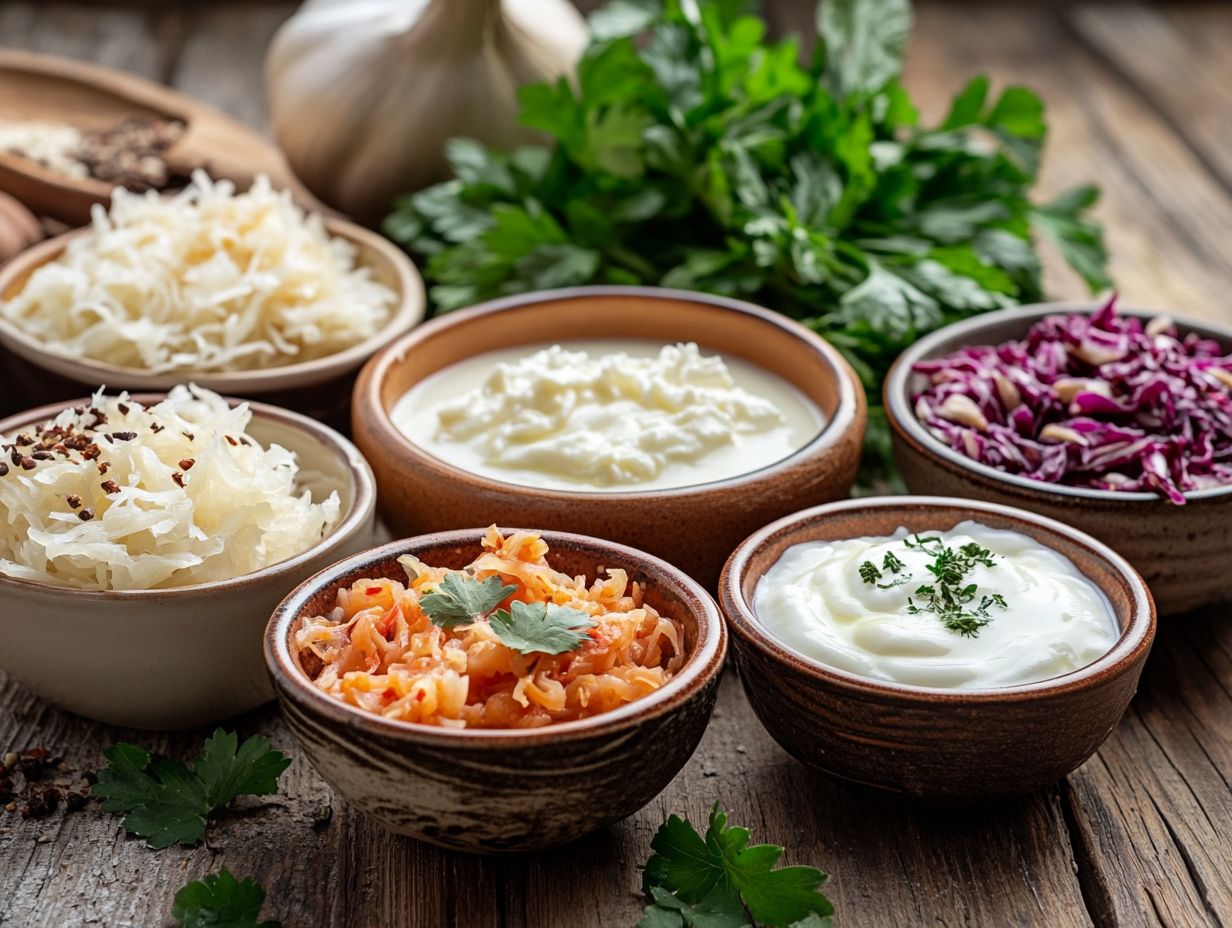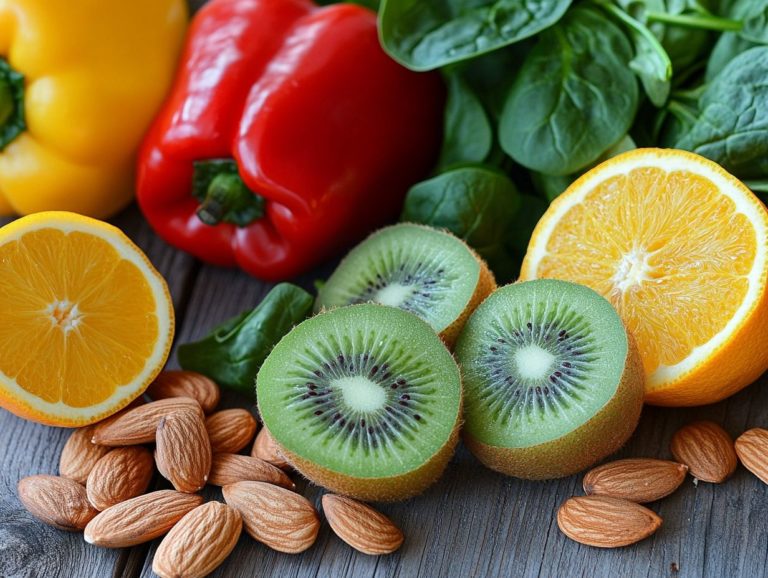The Connection Between Probiotics and Gut Health
Gut health is essential to your overall well-being, influencing everything from digestion to immune function. At the center of this intricate system is the gut microbiome a diverse community of microorganisms that profoundly affects your health.
Probiotics are often hailed as vital for maintaining gut health, helping you achieve a balanced microbiome. This article delves into the intricacies of the gut microbiome, the myriad benefits of probiotics, how to select the right supplement, and practical tips for integrating these nourishing foods into your daily diet.
Prepare to uncover the secrets to a healthier gut!
Contents
Key Takeaways:
Probiotics play a crucial role in maintaining a healthy gut microbiome, which is essential for overall digestive and immune health. Regular consumption of probiotics can improve digestion, boost immune function, and reduce inflammation, among other health benefits. When choosing a probiotic supplement, consider factors such as strain diversity and potency to ensure maximum effectiveness for your specific needs.
Understanding Gut Health
Understanding gut health is essential for maintaining your overall well-being. It is closely tied to the gut microbiome an intricate ecosystem made up of trillions of microorganisms that support your health.
The balance of beneficial bacteria is vital for effective digestion, bolstering your immune system, and warding off various ailments, including inflammatory bowel disease.
With a growing body of clinical research, the American Gastroenterological Association emphasizes the importance of understanding how your gut bacteria interacts with dietary fiber and other nutrients to foster harmony and enhance your overall health.
What is the Gut Microbiome?
The gut microbiome is a fascinating community of microorganisms, including various bacterial species, that resides in your gastrointestinal tract. This diverse ecosystem plays a crucial role in maintaining your gut health and overall wellness.
These microorganisms, comprising beneficial bacteria, yeasts, and even viruses, work together to assist with digestion, synthesize essential vitamins, and ward off harmful pathogens. A balanced gut microbiome is essential; it not only impacts how well you absorb nutrients but also modulates your immune system and contributes to your mental health.
When this delicate ecosystem faces disruptions often due to poor diet, stress, or antibiotic use it can lead to a range of health issues, including inflammatory bowel disease and obesity.
To cultivate a thriving microbiome, focusing on a diet rich in fiber and probiotics is key. This approach can help ensure optimal gastrointestinal function and enhance your overall vitality.
The Role of Probiotics in Gut Health
Probiotics are live microorganisms that, when consumed in sufficient quantities, offer remarkable health benefits.
They play a crucial role in promoting gut health and maintaining balance by boosting the levels of beneficial bacteria in your digestive system.
How Probiotics Affect the Gut Microbiome
Probiotics significantly shape your gut microbiome by transforming its bacterial composition. This transformation leads to the production of beneficial short-chain fatty acids that support your gut health.
When you introduce these microorganisms into your digestive system, they encourage the growth of beneficial species while keeping harmful ones at bay. As this composition shifts, the production of short-chain fatty acids such as butyrate, acetate, and propionate rises. This increase contributes to improved energy regulation, enhanced immune function, and reduced inflammation in your gut.
This intricate interplay of bacteria optimizes nutrient absorption and serves a vital function in maintaining the gut barrier, helping to prevent conditions like leaky gut syndrome. Embracing probiotics can be essential for nurturing a balanced microbiome and enhancing your overall digestive health.
Benefits of Probiotics for Gut Health
Probiotics offer amazing health benefits that can transform your gut health! They enhance digestion, bolster immune function, and reduce inflammation, establishing themselves as an essential part of a balanced diet.
Don’t wait! Start incorporating probiotics into your diet today for a healthier gut!
Improving Digestion and Immune Function
Probiotics can supercharge your digestion by breaking down food more efficiently and boosting nutrient absorption. They also play a vital role in strengthening your gut s immune function.
These helpful microorganisms, like Lactobacillus acidophilus and Bifidobacterium bifidum, assist in fermentation processes and produce essential short-chain fatty acids that nourish your gut cells.
Maintaining a balanced intestinal microbiome helps prevent the overgrowth of harmful bacteria, creating a healthier digestive environment. These probiotic strains contribute to producing antibodies and modulating immune responses, establishing your gut as a key player in your body s defense system.
The symbiotic relationship between your diet, probiotics, and gut health highlights their importance in enhancing your overall well-being.
Reducing Inflammation and Other Health Benefits
Probiotics have shown a remarkable ability to reduce gut inflammation, particularly benefiting individuals with inflammatory bowel disease, as numerous clinical studies affirm.
These helpful microorganisms restore the delicate balance of your gut flora, boosting your immune system’s ability to combat inflammation. Research highlights that specific strains, such as Lactobacillus and Bifidobacterium, can significantly alleviate symptoms associated with inflammatory bowel diseases like Crohn’s disease and ulcerative colitis.
A comprehensive meta-analysis of multiple studies indicates that patients who included probiotics in their treatment plans experienced notable reductions in inflammation markers and enhanced overall gut health.
The benefits don’t stop there; the anti-inflammatory properties of probiotics may also improve mood and lower the risk of other chronic diseases, providing a holistic approach to your well-being.
Choosing the Right Probiotic Supplement
Choosing the right probiotic can supercharge your gut health! It requires thoughtful consideration of several factors, such as the specific bacterial species included and the potential health benefits they offer.
Factors to Consider
When selecting a probiotic supplement, consider the types of bacterial species, the dosage, and the specific health benefits tied to each strain.
Understanding the wide variety of probiotic strains is vital, as certain species are designed to address particular health concerns, such as digestive health or immune support.
Evaluate the potency of the dosages; remember that higher colony-forming units (CFUs) don t always lead to better outcomes it s about finding the right balance for your individual needs.
The delivery method also plays a critical role; some strains may require enteric-coated capsules to survive the journey through your digestive tract.
Lastly, reviewing third-party testing and shelf stability is important to ensure the product remains effective up to its expiration date.
Incorporating Probiotics into Your Diet
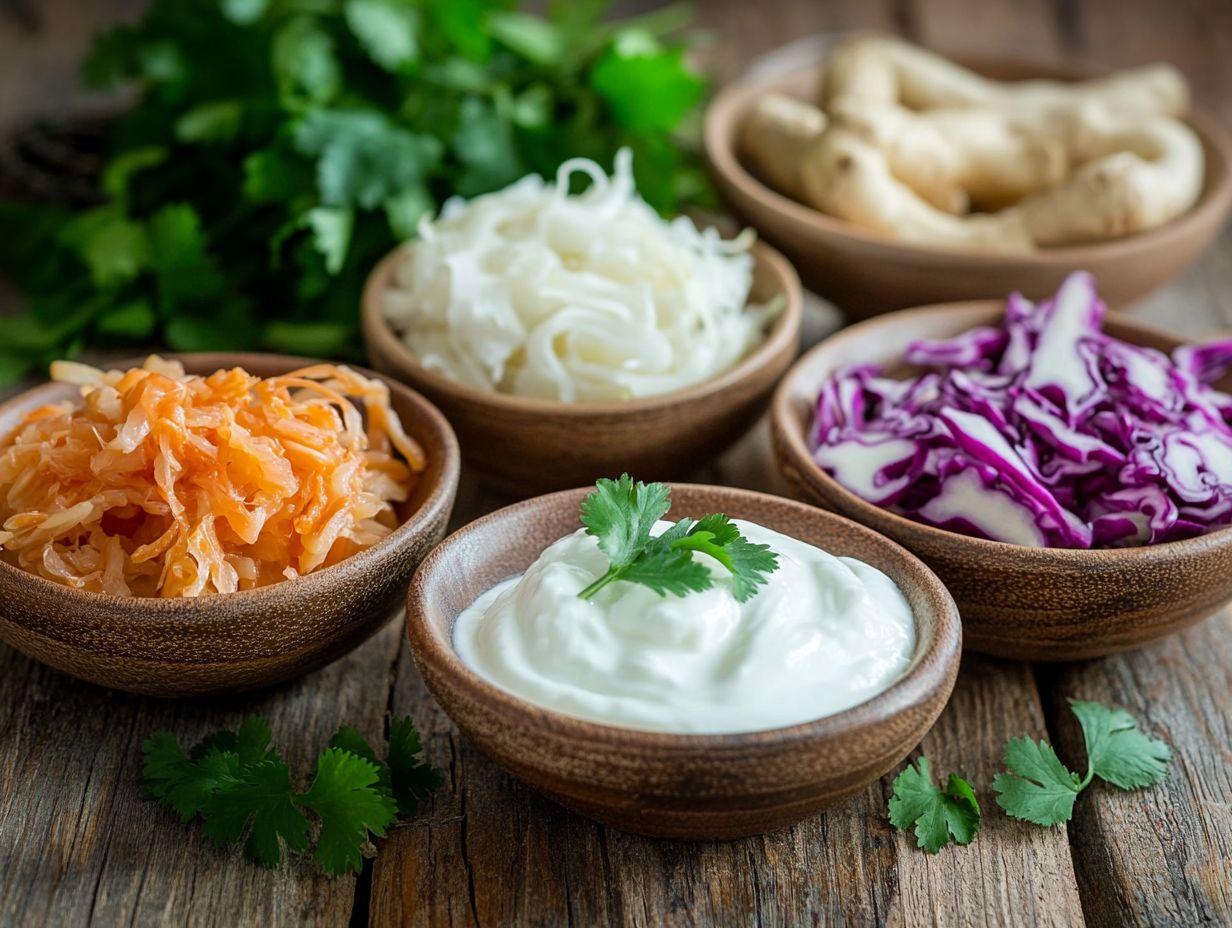
You can easily boost your gut health today by incorporating probiotics in fun and tasty ways!
Indulge in natural sources of probiotics, which are foods rich in dietary fiber and prebiotics that enhance your gut health.
Natural Sources of Probiotics
Natural sources of probiotics abound in a delightful array of fermented foods, including yogurt, kefir, sauerkraut, and kimchi. These culinary treasures are packed with beneficial bacteria crucial for supporting your gut health.
Each of these foods undergoes a specific fermentation process that elevates their flavor and enriches their microbial content. For example, yogurt is created by fermenting milk with live cultures like Lactobacillus, which can significantly enhance your digestion and bolster your immune system.
Then there’s kefir, that tangy drink made with kefir grains, offering a complex blend of bacteria and yeast for an even broader range of probiotics.
Don t overlook traditional sauerkraut and kimchi. These are crafted by fermenting cabbage, often with an infusion of spices and vegetables, promoting thriving gut flora and potentially aiding in nutrient absorption.
By incorporating these foods into your diet, you can pave the way to improved gut health and a greater sense of well-being.
Tips for Adding Probiotic Foods to Your Diet
Start integrating probiotic foods into your diet gradually. Begin with small servings of fermented foods, combining them with other healthy ingredients for tasty meals.
Try adding yogurt or kefir to your breakfast smoothies. They go well with fruits like bananas or berries, boosting flavor and nutrients.
For lunch or dinner, consider adding a splash of kimchi to your stir-fry. This allows the probiotics to meld with the vitamins from fresh vegetables. Tossing sauerkraut onto your sandwiches elevates your meal and provides essential dietary fiber.
Probiotics work best when combined with prebiotic foods like garlic and onions. This combination maximizes digestive benefits and creates a delightful synergy.
Get ready for an exciting journey toward a probiotic-rich lifestyle! Experiment with various recipes and serving sizes to make your transition a flavorful adventure.
Frequently Asked Questions
What is the connection between probiotics and gut health?
Probiotics are live bacteria and yeasts that help maintain a healthy balance of microorganisms in the gut, improving overall gut health.
How do probiotics affect gut health?
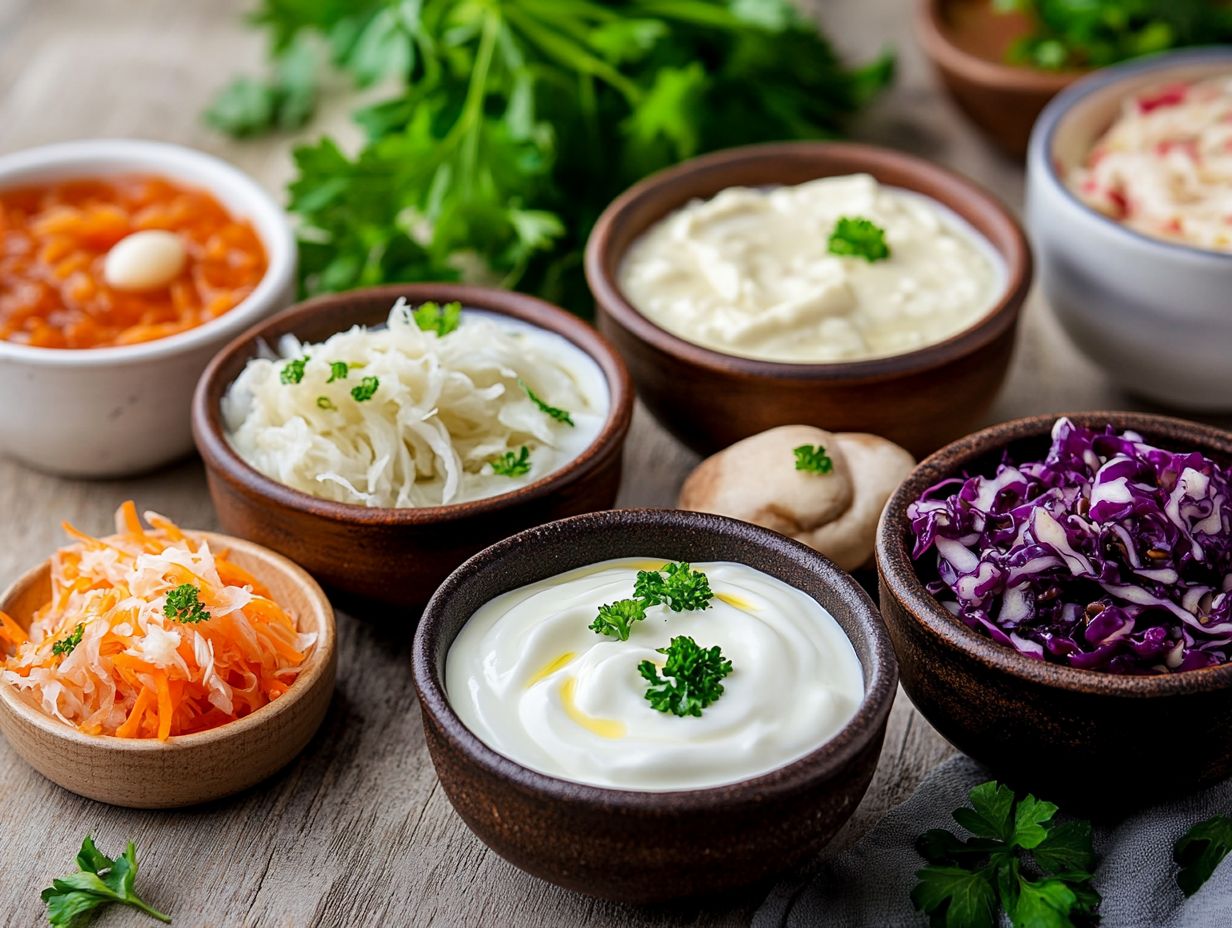
Probiotics improve gut health by increasing beneficial microorganisms, preventing harmful bacteria from multiplying and causing digestive issues.
Can probiotics improve digestion?
Yes, probiotics enhance digestion by helping the gut break down food and absorb nutrients effectively. They also regulate bowel movements, reducing the risk of constipation or diarrhea.
What are some other benefits of probiotics for gut health?
In addition to improving digestion, probiotics can boost the immune system, reduce inflammation, and potentially enhance mental health and skin conditions.
How can I incorporate probiotics into my diet?
Probiotics can be found in fermented foods such as yogurt, kefir, sauerkraut, and kimchi. They are also available as supplements in capsules, powders, or liquids.
What are some factors that can disrupt the balance of gut bacteria?
Poor diet, stress, certain medications, and infections can disrupt gut bacteria balance and lead to digestive issues. Incorporating probiotics can help restore this balance and improve gut health.

